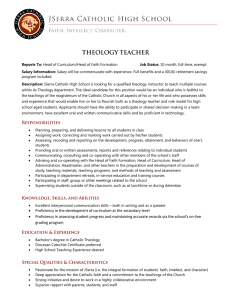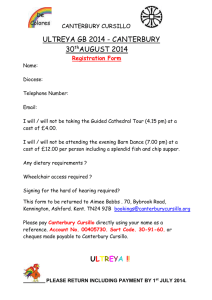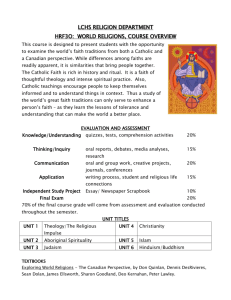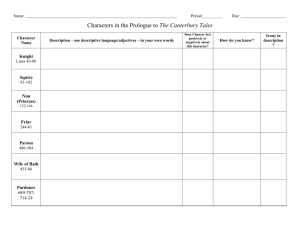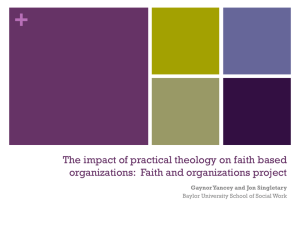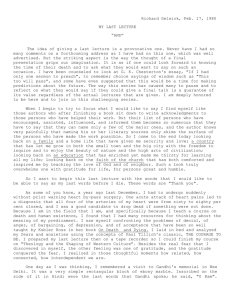John Mills (190-2016)
advertisement
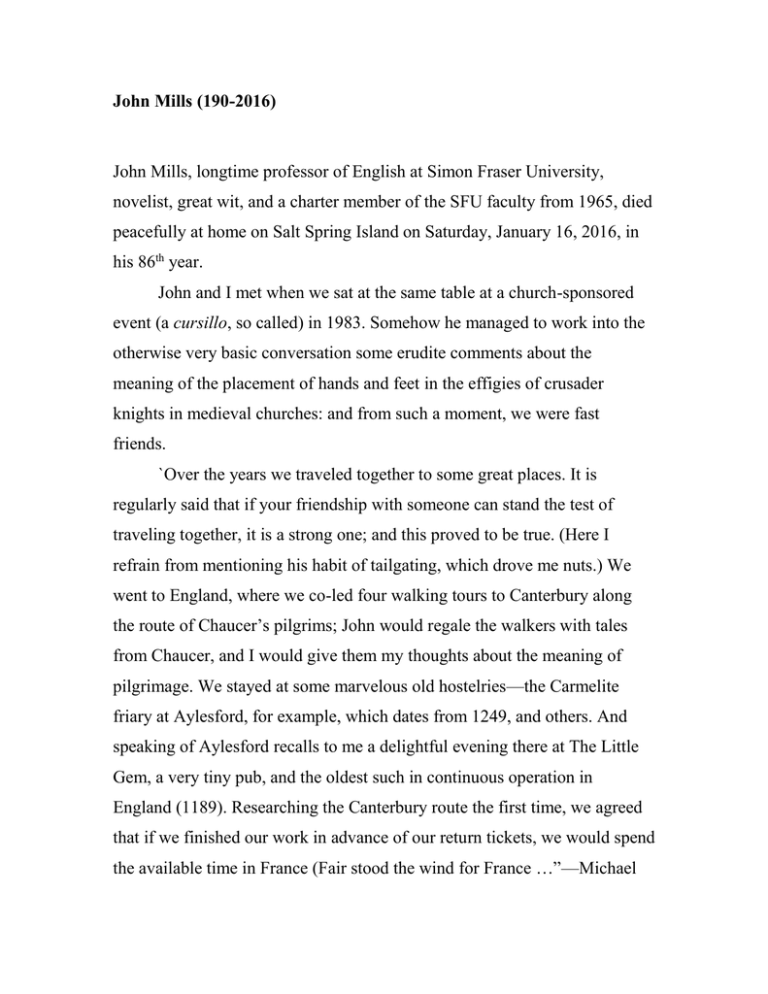
John Mills (190-2016) John Mills, longtime professor of English at Simon Fraser University, novelist, great wit, and a charter member of the SFU faculty from 1965, died peacefully at home on Salt Spring Island on Saturday, January 16, 2016, in his 86th year. John and I met when we sat at the same table at a church-sponsored event (a cursillo, so called) in 1983. Somehow he managed to work into the otherwise very basic conversation some erudite comments about the meaning of the placement of hands and feet in the effigies of crusader knights in medieval churches: and from such a moment, we were fast friends. `Over the years we traveled together to some great places. It is regularly said that if your friendship with someone can stand the test of traveling together, it is a strong one; and this proved to be true. (Here I refrain from mentioning his habit of tailgating, which drove me nuts.) We went to England, where we co-led four walking tours to Canterbury along the route of Chaucer’s pilgrims; John would regale the walkers with tales from Chaucer, and I would give them my thoughts about the meaning of pilgrimage. We stayed at some marvelous old hostelries—the Carmelite friary at Aylesford, for example, which dates from 1249, and others. And speaking of Aylesford recalls to me a delightful evening there at The Little Gem, a very tiny pub, and the oldest such in continuous operation in England (1189). Researching the Canterbury route the first time, we agreed that if we finished our work in advance of our return tickets, we would spend the available time in France (Fair stood the wind for France …”—Michael Drayton). In the event, we had only one free day, and went to France anyway, spending a glorious 24 hours in Boulogne. Another time, we met at St-Jean de Luz, on the Atlantic coast of France, and went from there to St Jean-Pied-de-Port, our starting point for a climb (yes, we were younger then) over the Pyrenees, to Roncesvalles. It was a magic moment for us at the top of the pass when we came across the monument to Roland, he of the horn he blew too late, with only his name and the date--997—on its surface. Once in Spain, we researched the Camino, hoping to lead another pilgrimage there, which, alas, never came to be. Pure delight also was a trip we made to the Oregon Shakespeare Festival in Ashland, where we glutted ourselves on five plays in three days. One of our pleasures was trying to stump each other with quotations from Shakespeare; he usually won, but I flatter myself that I proved a worthy opponent. I mentioned meeting John at a cursillo. Until midlife, John was an atheist, but came to faith at that time, as many do—an easier transition, as has often been noted, from atheism to faith than from agnosticism, since atheism is its own kind of faith. Even so, he continued to espouse a bleak view of the universe, which I privately connected with his difficult childhood; but somehow his faith enables him to move past this. From then on, he was an active Anglican of a liberal kind, and a great reader of theology. Eventually he followed up on this interest by doing a master’s degree at the Vancouver School of Theology at UBC. He and I had uncounted conversations on theology and spirituality, something of which neither of us ever tired. He and his wife Elaina, like myself an Anglican cleric, and until her recent retirement a hospital chaplain in Victoria, have many times in recent years given me very gracious hospitality at their beautiful house on Salt Spring. I’ve said to both of them, that once I pass the gate to their property, I feel myself in the south of France. A particular attraction of the house is the many glades in the garden, in each of which are found a table and chairs, where they and their friends would sit and share libations, choosing among the various possibilities according to the weather. John was also a great cook, even at one point publishing a hilarious cookbook called Youth, Father, Curmudgeon, with recipes suitable for male cooks in these particular phases of life. I have said to three or four people that I had more fun with John than with almost anyone else I have ever known. His death, I know, will be felt as a great loss, not only by Elaina, but by his many friends and admirers. Dear John, may you rest in peace, and rise in glory. Donald Grayston Department of Humanities 1989-2004

